Charles E W Bean, Diaries, AWM38 3DRL 606/254/1 - 1917 - 1933 - Part 7
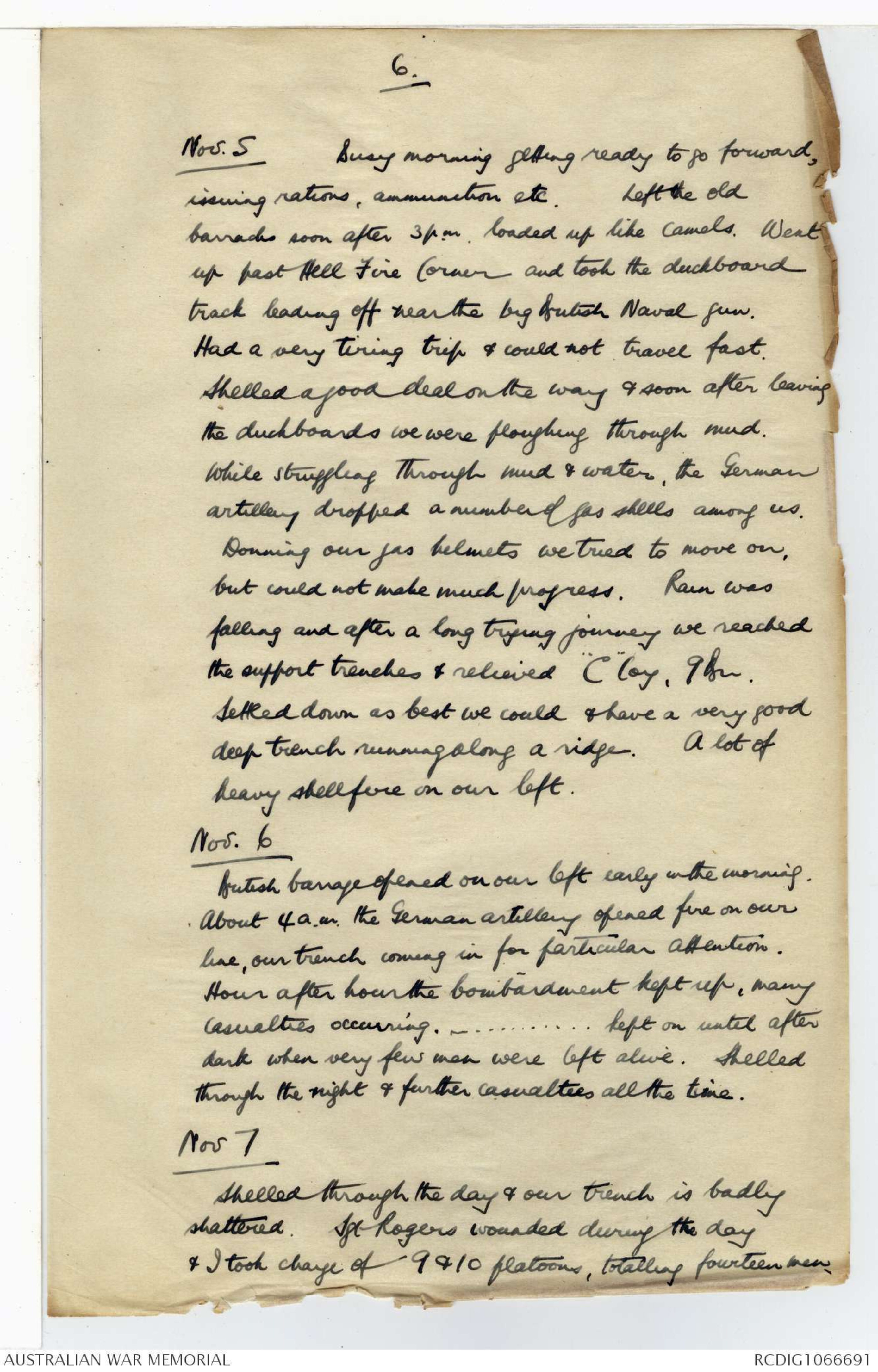
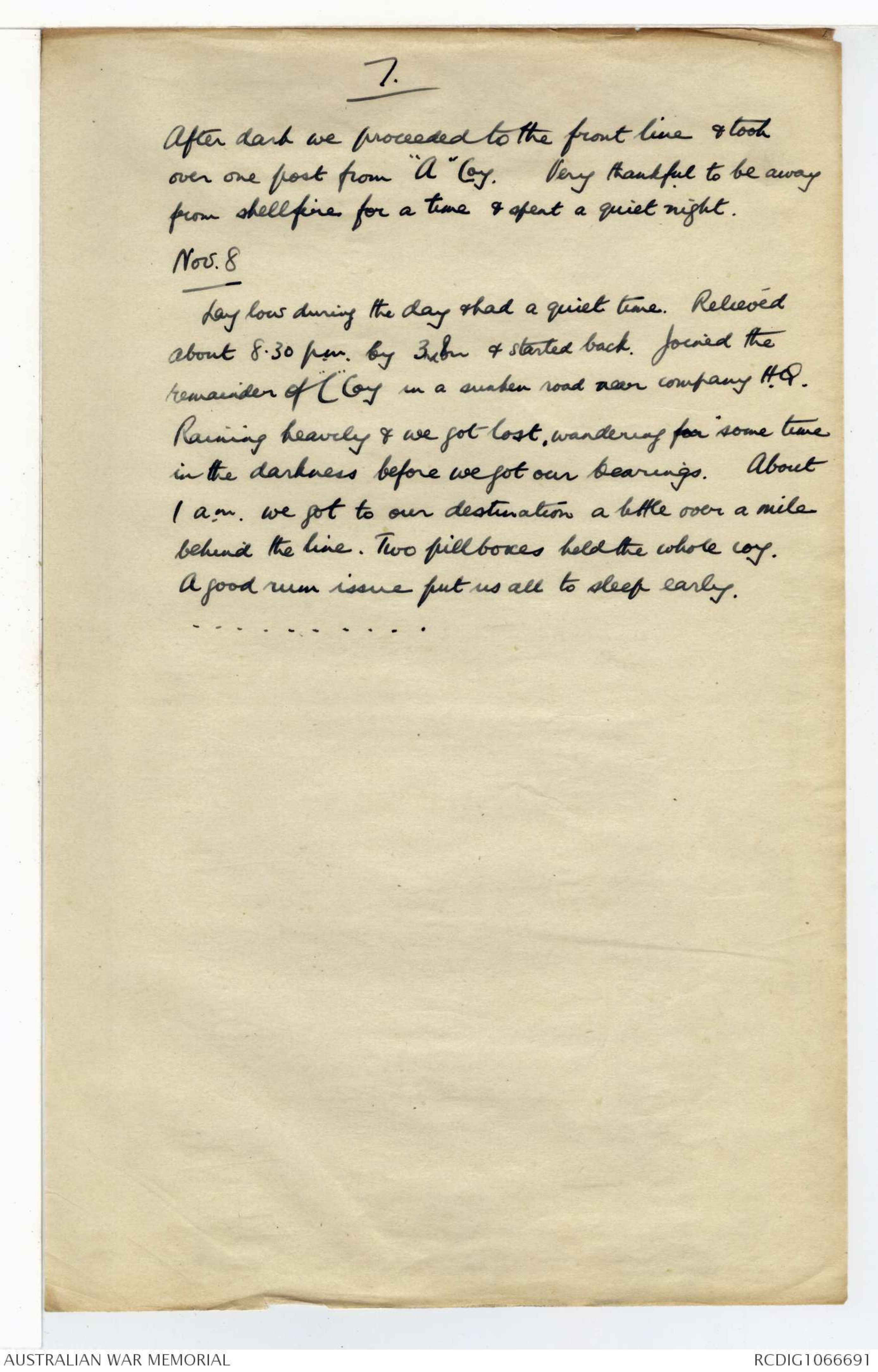
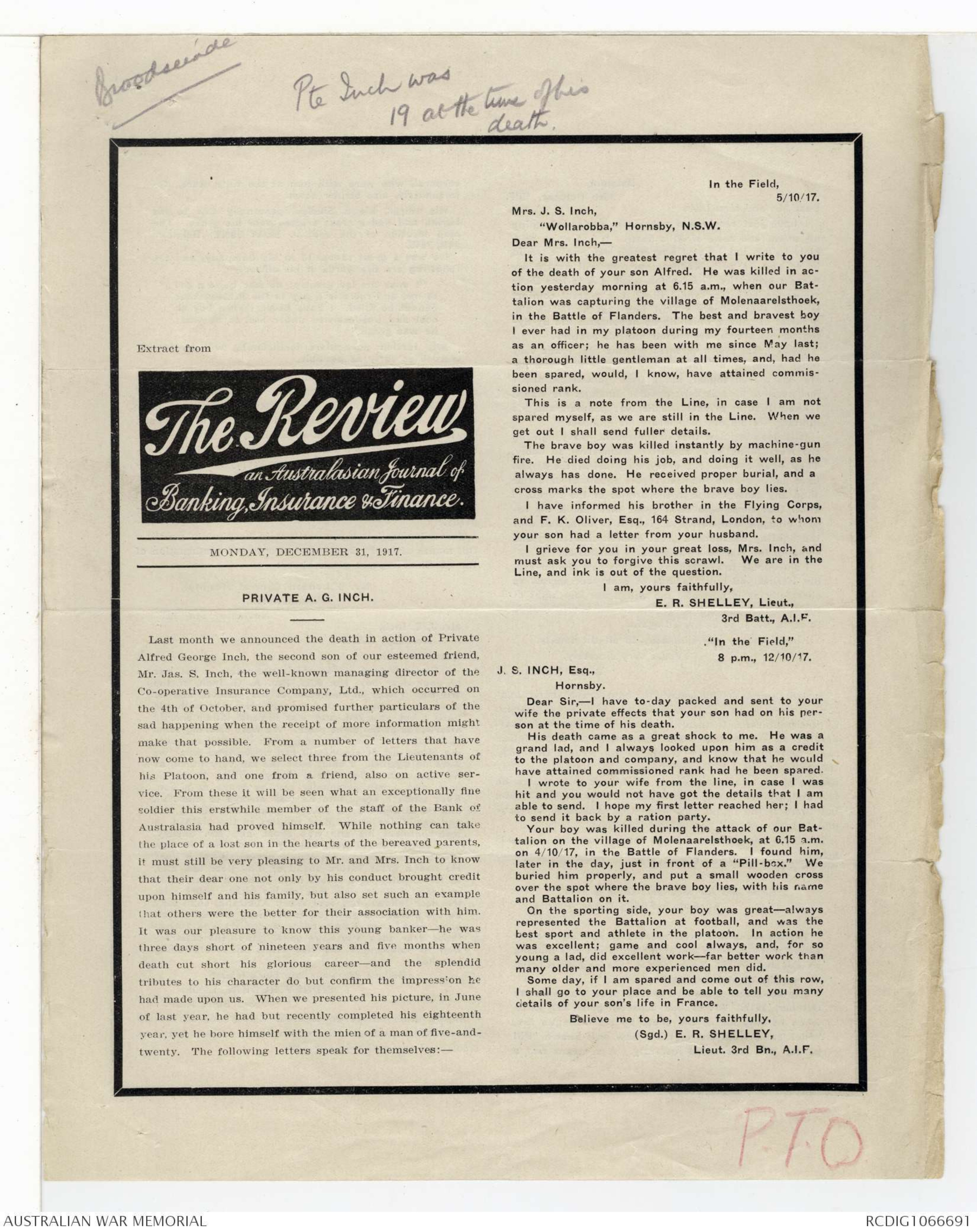
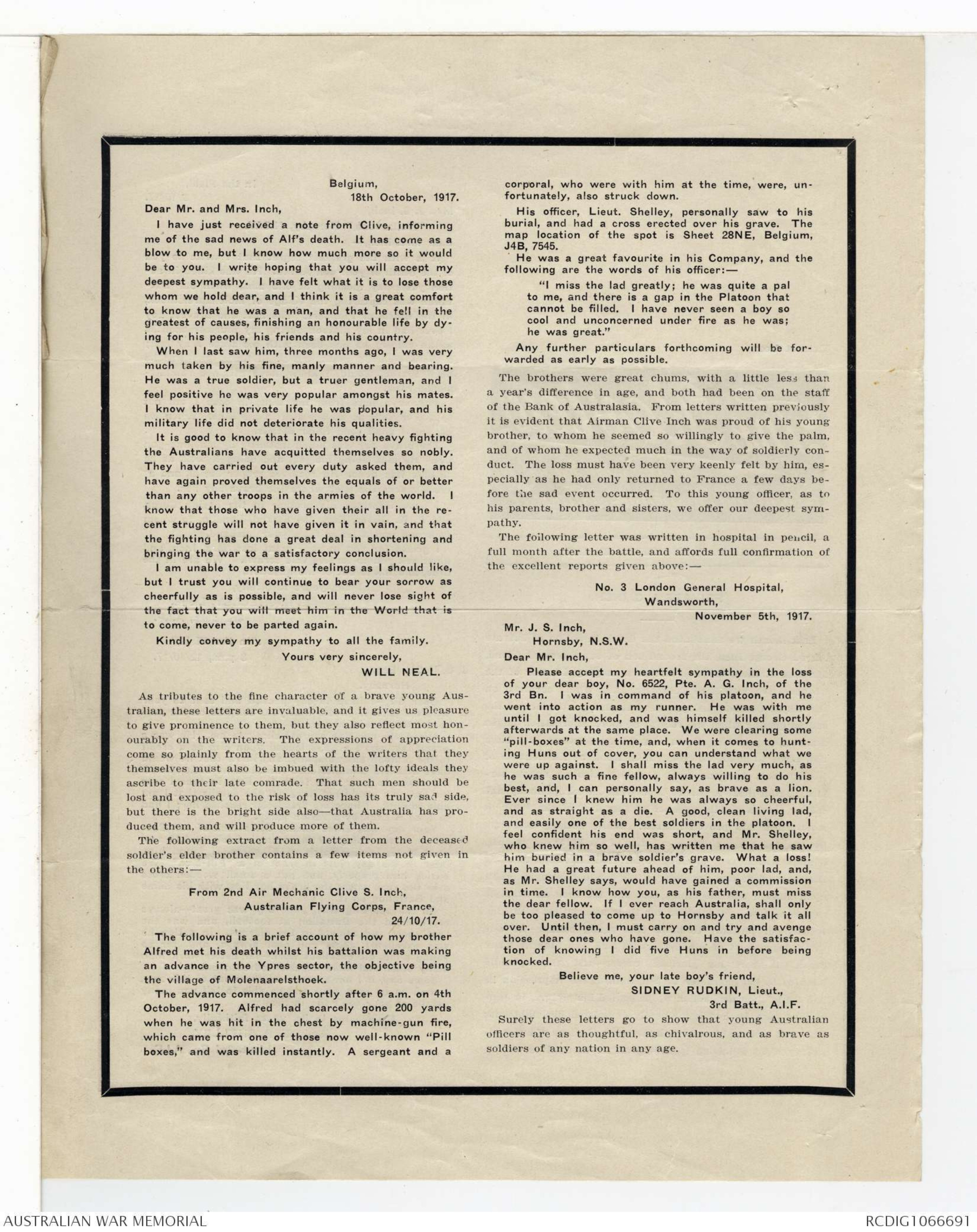
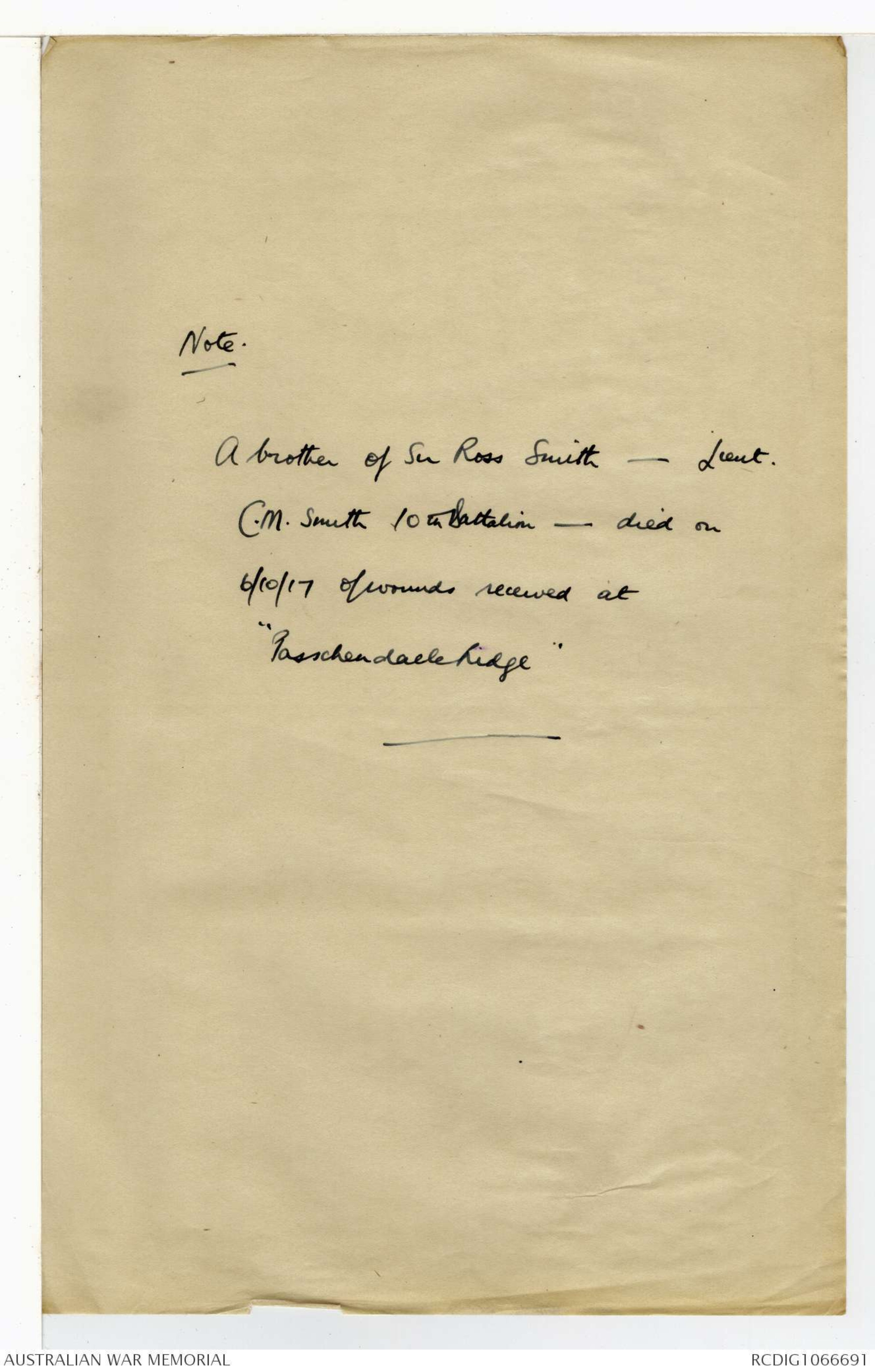
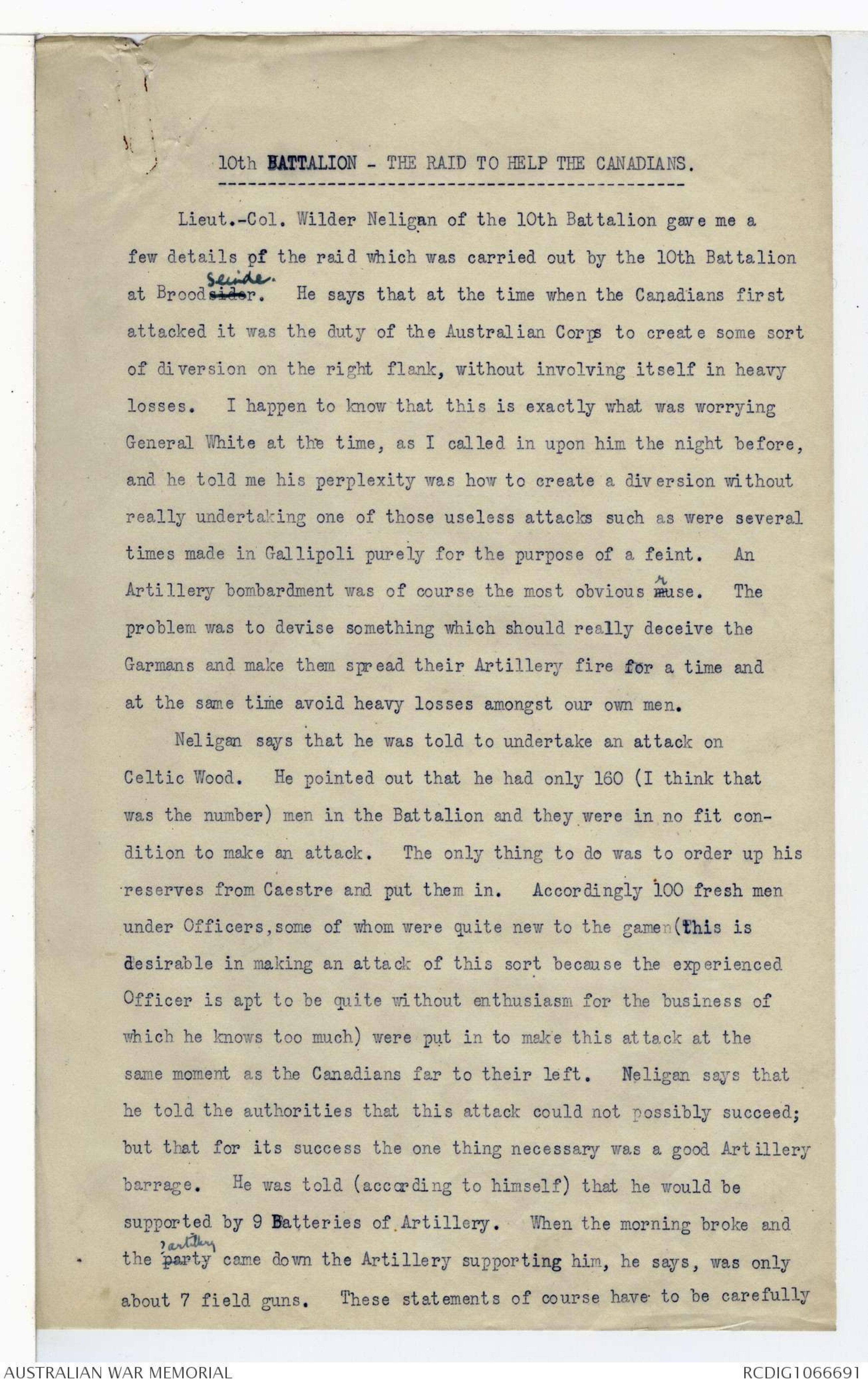
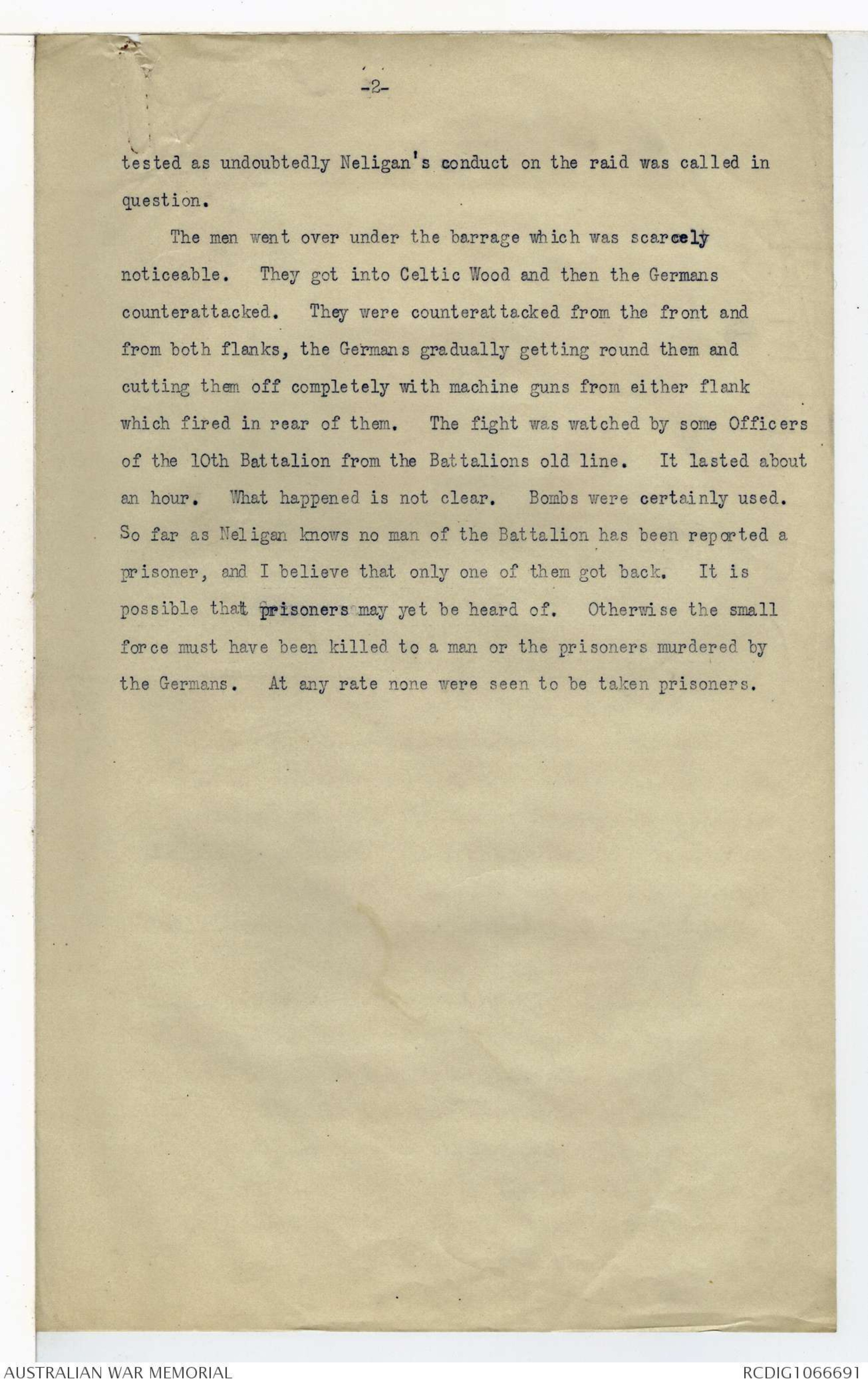
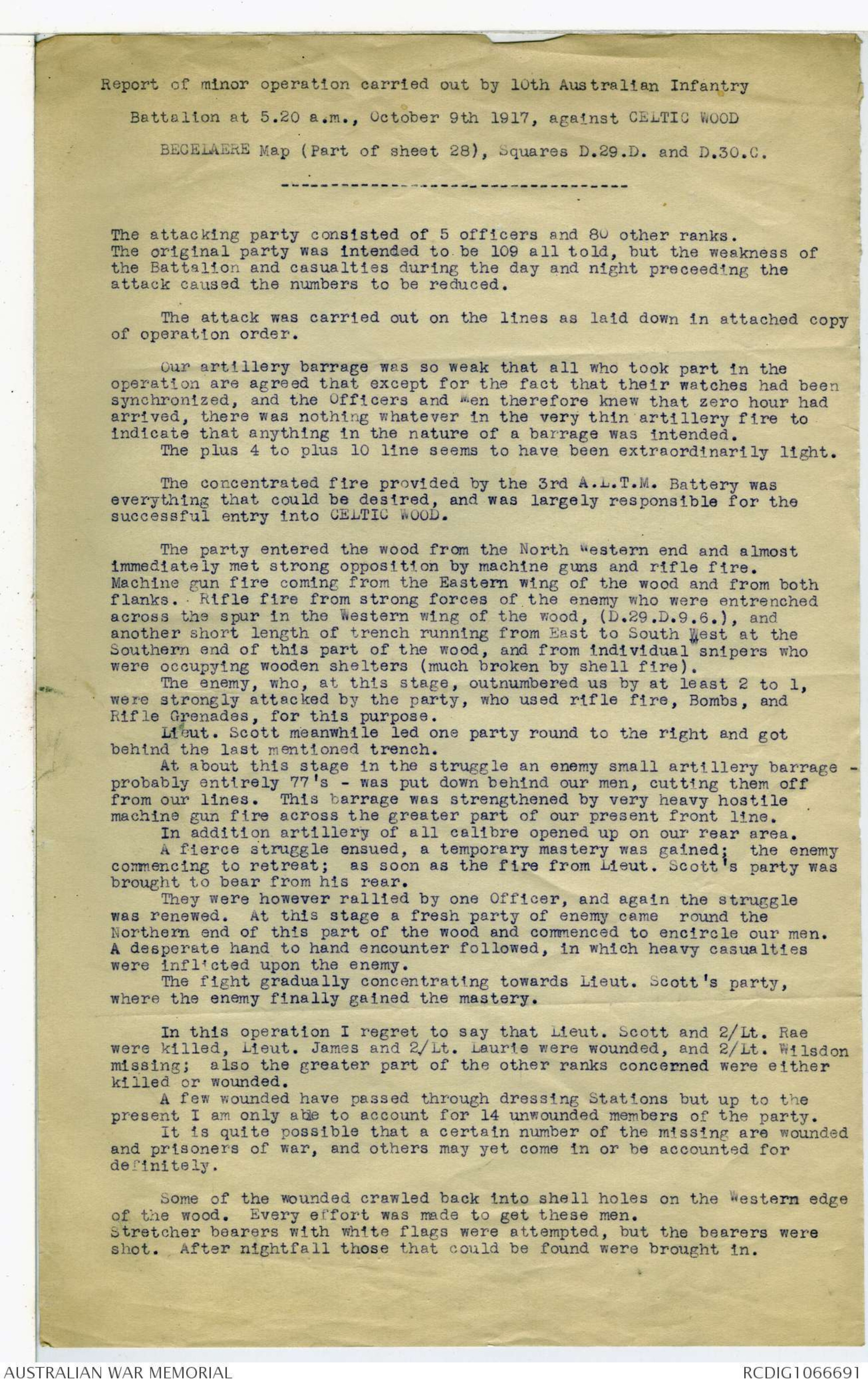
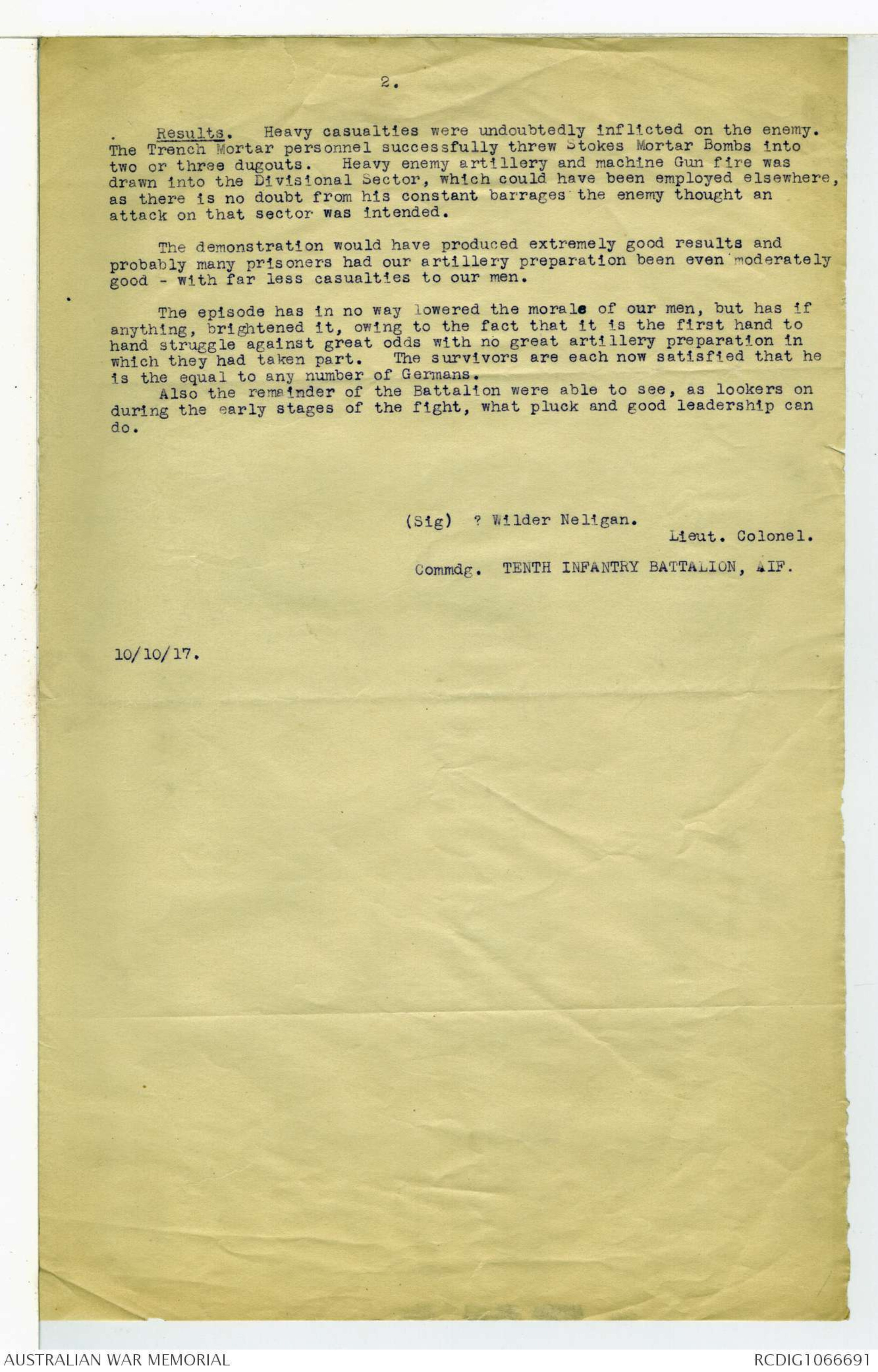
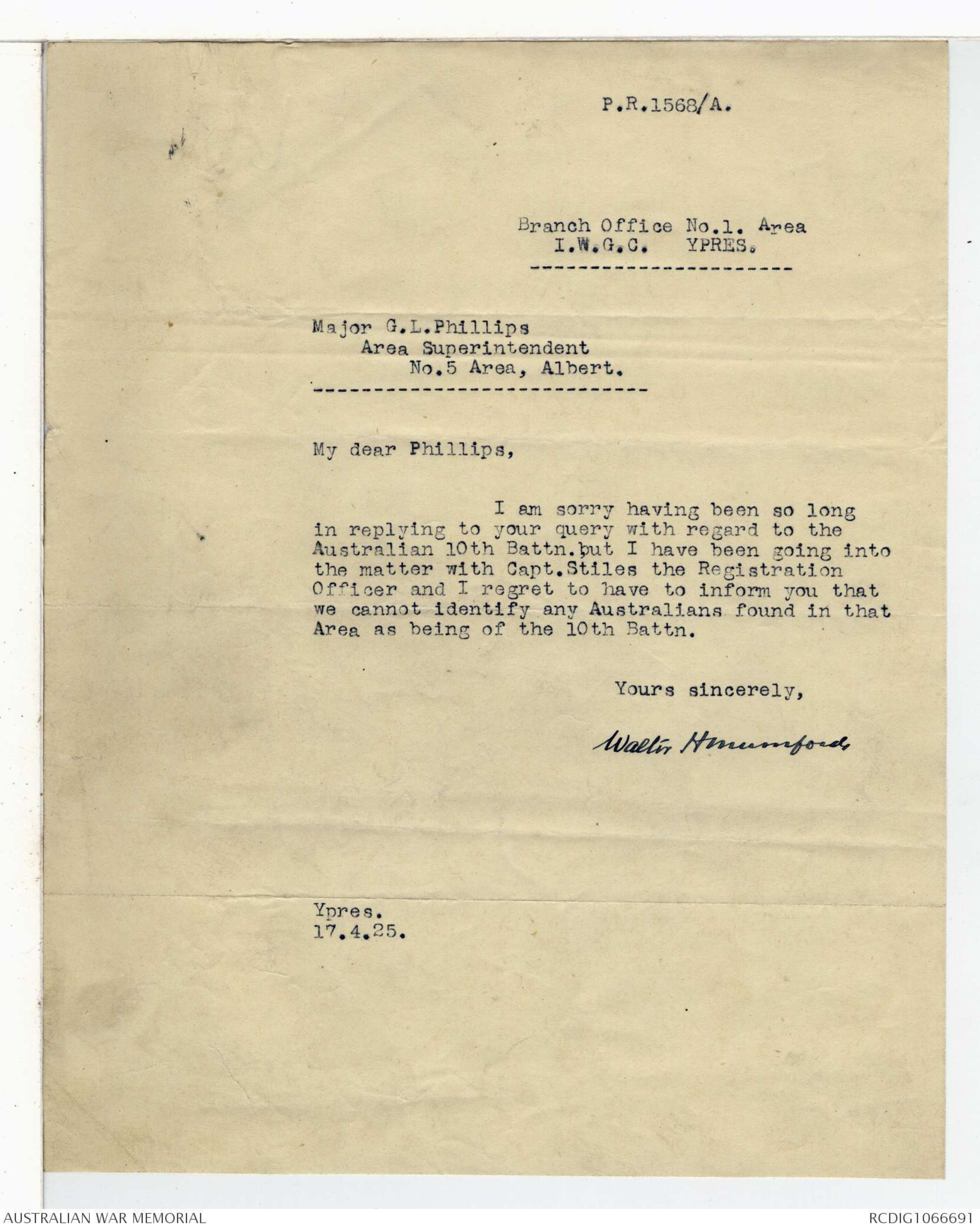
6.
Nov.5
Busy morning getting ready to go forward,
issuing rations, ammunition etc. Left the old
barracks soon after 3p.m. loaded up like camels. Went
up past Hell Fire Corner and took the duckboard
track leading off near the big British Naval gun.
Had a very tiring trip & could not travel fast.
Shelled a good deal on the way & soon after leaving
the duckboards we were ploughing through mud.
While struggling through mud & water, the German
artillery dropped a number of gas shells among us.
Donning our gas helmets we tried to move on,
but could not make much progress. Rain was
falling and after a long trying journey we reached
the support trenches & relieved "C" Coy, 9 Bn.
Settled down as best we could & have a very good
deep trench running along a ridge. A lot of
heavy shellfire on our left.
Nov. 6
British barrage opened on our left early in the morning.
About 4a.m. the German artillery opened fire on our
line, our trench coming in for particular attention.
Hour after hour the bombardment kept up, many
casualties occurring. . . . . . . . . kept on until after
dark when very few men were left alive. Shelled
through the night & further casualties all the time.
Nov 7
Shelled through the day & our trench is badly
shattered. Sgt Rogers wounded during the day
I took charge of 9 & 10 platoons, totalling fourteen men
7.
After dark we proceeded to the front line & took
over one post from "A" Coy. Very thankful to be away
from shellfire for a time & spent a quiet night.
Nov. 8
Lay low during the day & had a quiet time. Relieved
about 8.30 p.m.. by 3rd Bn & started back. Joined the
remainder of 'C" Coy in a sunken road near company H.Q.
Raining heavily & we got lost, wandering for some time
in the darkness before we got our bearings. About
1 am. we got to our destination a little over a mile
behind the line. Two pillboxes held the whole coy
A good rum issue put us all to sleep early.
[*Broodseinde
Pte Inch was
19 at the time of his
death*]
Extract from The Review
an Australasian Journal of
Banking, Insurance & Finance.
MONDAY, DECEMBER 31, 1917
PRIVATE A.G. INCH
Last month we announced the death in action of Private
Alfred George Inch, the second son of our esteemed friend,
Mr. Jas S. Inch, the well known managing director of the
Co-operative Insurance Company, Ltd., which occurred on
the 4th of October, and promised further particulars of the
sad happening when the receipt of more information might
make that possible. From a number of letters that have
now come to hand, we select three from the Lieutenants of
his Platoon, and one from a friend, also on active service.
From these it will be seen what an exceptionally fine
soldier this erstwhile member of the staff of the Bank of
Australasia had proved himself. While nothing can take
the place of a lost son in the hearts of the bereaved parents,
it must still be very pleasing to Mr. and Mrs. Inch to know
that their dear one not only by his conduct brought credit
upon himself and his family, but also set such an example
that others were the better for their association with him.
It was our pleasure to know this young banker—he was
three days short of nineteen years and five months when
death cut short his glorious career—and the splendid
tributes to his character do but confirm the impression he
had made upon us. When we presented his picture, in June
of last year, he had but recently completed his eighteenth
year, yet he bore himself with the mien of a man of five-and-
twenty. The following letters speak for themselves:—
In the Field,
5/10/17.
Mrs. J. S. inch,
"Wollarobba," Hornsby, N.S.W.
Dear Mrs. Inch—
It is with the greatest regret that I write to you
of the death of your son Alfred. He was killed in action
yesterday morning at 6.15 a.m., when our Battalion
was capturing the village of Molenaarelsthoek,
in the Battle of Flanders. The best and bravest boy
I ever had in my platoon during my fourteen months
as an officer; he has been with me since May last;
a thorough little gentleman at all times, and, had he
been spared, would, 1 know, have attained commissioned
rank.
This is a note from the Line, in case I am not
spared myself, as we are still in the Line. When we
get out I shall send fuller details.
The brave boy was killed instantly by machine-gun
fire. He died doing his job, and doing it well, as he
always has done. He received proper burial, and a
cross marks the spot where the brave boy lies.
I have informed his brother in the Flying Corps,
and F. K. Oliver, Esq., 164 Strand, London, to whom
your son had a letter from your husband.
I grieve for you in your great loss, Mrs. Inch, and
must ask you to forgive this scrawl. We are in the
Line, and ink is out of the question.
I am, yours faithfully,
E.R. SHELLEY, Lieut.,
3rd Batt, A.l.F.
"In the Field,"
8 p.m., 12/10/17
J.S. INCH, Esq
Hornsby
Dear Sir I have to-day packed and sent to your
wife the private effects that your son had on his person
at the time of bis death.
His death came as a great shock to me. He was a
grand lad, and I always looked upon him as a credit
to the platoon and company, and know that he would
have attained commissioned rank had he been spared.
I wrote to your wife from the line, in case I was
hit and you would not have got the details that I am
able to send. I hope my first letter reached her; I had
to send it back by a ration party.
Your boy was killed during the attack of our Battalion
on the village of Molenaarelsthoek, at 6.15 a.m.
on 4/10/17, in the battle of Flanders. I found him,
later that day, just in front of a "Pill-box." We
buried him properly, and put a small wooden cross
over the spot where the brave boy lies, with his name
and Battalion on it.
On the sporting side, your boy was great—always
represented the Battalion at football, and was the
best sport and athlete in the platoon. In action he
was excellent; game and cool always, and, for so
young a lad, did excellent work—far better work then
many older and more experienced men did.
Some day, if I am spared and come out of this row,
I shall go to your place and be able to tell you many
details of your son's life in France.
Believe me to be, your faithfully,
(Sgd) E.R. Shelley,
Lieut. 3rd Bn., A.I.F.
[*P.T.O.}
Belgium,
18th October, 1917.
Dear Mr. and Mrs. Inch,
I have just received a note from Clive, informing
me of the sad news of Alf's death. It has come as a
blow to me, but I know how much more so it would
be to you. I write hoping that you will accept my
deepest sympathy. I have felt what it is to lose those
whom we hold dear, and I think it is a great comfort
to know that he was a man, and that he fell in the
greatest of causes, finishing an honourable life by dying
for his people, his friends and his country.
When I last saw him, three months ago, I was very
much taken by his fine, manly manner and bearing.
He was a true soldier, but a truer gentleman, and 1
feel positive he was very popular amongst his mates.
I know that in private life he was popular, and his
military life did not deteriorate his qualities.
It is good to know that in the recent heavy fighting
the Australians have acquitted themselves so nobly.
They have carried out every duty asked them, and
have again proved themselves the equals of or better
than any other troops in the armies of the world. I
know that those who have given their all in the recent
struggle will not have given it in vain, and that
the fighting has done a great deal in shortening and
bringing the war to a satisfactory conclusion.
I am unable to express my feelings as I should like,
but I trust you will continue to bear your sorrow as
cheerfully as is possible, and will never lose sight of
the fact that you witt meet him in the World that is
to come, never to be parted again.
Kindly convey my sympathy to all the family,
Yours very sincerely,
WILL NEAL.
As tributes to the fine character of a brave young Australlan,
these letters are invaluable, and it gives us pleasure
to give prominence to them, but they also reffect most honourably
on the writers. The expressions of appreciation
come so plainly from the hearts of the writers that they
themselves must also be imbued with the lofty ideals they
ascribe to their late comrade. That such men should be
lost and exposed to the risk of loss has its truly sad side,
but there is the bright side also—that Australia has produced
them, and will produce more of them.
The following extract from a letter from the deceased
soldier's elder brother contains a few items not given in
the others:—
From 2nd Air Mechanic Clive S. inch,
Australian Flying Corps, France,
24/10/17.
The following is a brief account of how my brother
Alfred met his death whilst his battalion was making
an advance in the Ypres sector, the objective being
the village of Molenaarelsthoek.
The advance commenced shortly after 6 a.m. on 4th
October, 1917. Alfred had scarcely gone 200 yards
when he was hit in the chest by machine-gun fire,
which came from one of those now well-known "Pill
boxes," and was killed instantly. A sergeant and a
corporal, who were with him at the time, were,
unfortunately, also struck down.
His officer, Lieut. Shelley, personally saw to his
burial, and had a cross erected over his grave. The
map location of the spot is Sheet 28NE, Belgium,
J4B, 7545.
He was a great favourite in his Company, and the
following are the words of his officer :—
"I miss the lad greatly; he was quite a pal
to me, and there is a gap in the Platoon that
cannot be filled. I have never seen a boy so
cool and unconcerned under fire as he was;
he was great."
Any further particulars forthcoming will be forwarded
as early as possible.
The brothers were great chums, with a little less than
a years difference in age, and both had been on the staff
of the Bank of Australasia. From letters written previously
it is evident that Airman Clive Inch was proud of his young
brother, to whom he seemed so willingly to give the palm,
and of whom he expected much in the way of soldierly conduct.
The loss must have been very keenly felt by him, especially
as he had only returned to France a few days before
the sad event occurred. To this young officer, as to
his parents, brother and sisters, we offer our deepest sympathy.
The following letter was written in hospital in pencil, a
full month after the battle, and affords full confirmation of
the excellent reports given above:—
No. 3 London General Hospital,
Wandsworth,
November 5th, 1917.
Mr. J. S. Inch,
Hornsby, N.S.W.
Dear Mr. Inch,
Please accept my heartfelt sympathy in the loss
of your dear boy, No. 6522, Pte. A. G. inch, of the
3rd Bn. I was in command of his platoon, and he
went into action as my runner. He was with me
until I got knocked, and was himself killed shortly
afterwards at the same place. We were clearing some
"pill-boxes" at the time, and, when it comes to hunting
Huns out of cover, you can understand what we
were up against. I shall miss the lad very much, as
he was such a fine fellow, always willing to do his
best, and, I can personally say, as brave as a lion.
Ever since I knew him he was always so cheerful,
and as straight as a die. A good, clean living lad,
and easily one of the best soldiers in the platoon. I
feel confident his end was short, and Mr. Shelley,
who knew him so well, has written me that he saw
him buried in a brave soldier's grave. What a loss!
He had a great future ahead of him, poor lad, and,
as Mr. Shelley says, would have gained a commission
in time. I know how you, as his father, must miss
the dear fellow. If I ever reach Australia, shall only
be too pleased to come up to Hornsby and talk it all
over. Until then, I must carry on and try and avenge
those dear ones who have gone. Have the satisfaction
of knowing I did five Huns in before being
knocked.
Believe me, your late boy's friend,
SIDNEY RUDKIN, Lieut.
3rd Batt, A.L.F.
Surely these letters go to show that young Australian
officers are as thoughtful, as chivalrous, and as brave as
soldiers of any nation in any age.
Note.
A brother of Sir Ross Smith - Lieut.
C.M. Smith 10th Battalion – died on
6/10/17 of wounds received at
"Passchendaele Ridge"
10th BATTALION - THE RAID TO HELP THE CANADIANS.
Lieut.-Col. Wilder Neligan of the 10th Battalion gave me a
few details of the raid which was carried out by the 10th Battalion
at Broodsiderseinde. He says that at the time when the Canadians first
attacked it was the duty of the Australian Corps to create some sort
of diversion on the right flank, without involving itself in heavy
losses. I happen to know that this is exactly what was worrying
General White at the time, as I called in upon him the night before,
and he told me his perplexity was how to create a diversion without
really undertaking one of those useless attacks such as were several
times made in Gallipoli purely for the purpose of a feint. An
Artillery bombardment was of course the most obvious mruse. The
problem was to devise something which should really deceive the
Garmans and make them spread their Artillery fire for a time and
at the same time avoid heavy losses amongst our own men.
Neligan says that he was told to undertake an attack on
Celtic Wood. He pointed out that he had only 160 (I think that
was the number) men in the Battalion and they were in, no fit condition
to make an attack. The only thing to do was to order up his
reserves from Caestre and put them in. Accordingly 100 fresh men
under Officers, some of whom were quite new to the game (this is
desirable in making an attack of this sort because the experienced
Officer is apt to be quite without enthusiasm for the business of
which he knows too much) were put in to make this attack at the
same moment as the Canadians far to their left. Neligan says that
he told the authorities that this attack could not possibly succeed;
but that for its success the one thing necessary was a good Artillery
barrage. He was told (according to himself) that he would be
supported by 9 Batteries of Artillery. When the morning broke and
the party ? artillery came down the Artillery supporting him, he says, was only
about 7 field guns. These statements of course have to be carefully
- 2 -
tested as undoubtedly Neligan's conduct on the raid was called in
question.
The men went over under the barrage which was scarcely
noticeable. They got into Celtic Wood and then the Germans
counterattacked. They were counterattacked from the front and
from both flanks, the Germans gradually getting round them and
cutting them off completely with machine guns from either flank
which fired in rear of them. The fight was watched by some Officers
of the 10th Battalion from the Battalions old line. It lasted about
an hour. What happened is not clear. Bombs were certainly used.
So far as Neligan knows no man of the Battalion has been reported a
prisoner, and I believe that only one of them got back. It is
possible that prisoners may yet be heard of. Otherwise the small
force must have been killed to a man or the prisoners murdered by
the Germans. At any rate none were seen to be taken prisoners.
Report of minor operation carried out by 10th Australian Infantry
Battalion at 5.20 a.m., October 9th 1917, against CELTIC WOOD
BECELAERE Map (Part of sheet 28), Squares D.29.D. and D.30.C.
The attacking party consisted of 5 officers and 80 other ranks.
The original party was intended to be 109 all told, but the weakness of
the Battalion and casualties during the day and night preceeding the
attack caused the numbers to be reduced.
The attack was carried out on the lines as laid down in attached copy
of operation order.
Our artillery barrage was so weak that all who took part in the
operation are agreed that except for the fact that their watches had been
synchronized, and the Officers and Men therefore knew that zero hour had
arrived, there was nothing whatever in the very thin artillery fire to
indicate that anything in the nature of a barrage was intended.
The plus 4 to plus 10 line seems to have been extraordinarily light.
The concentrated fire provided by the 3rd A.L.T.M. Battery was
everything that could be desired, and was largely responsible for the
successful entry into CELTIC WOOD.
The party entered the wood from the North Western end and almost
immediately met strong opposition by machine guns and rifle fire.
Machine gun fire coming from the Eastern wing of the wood and from both
flanks. Rifle fire from strong forces of the enemy who were entrenched
across the spur in the Western wing of the wood, (D.29.D.9.6.), and
another short length of trench running from East to South West at the
Southern end of this part of the wood, and from individual snipers who
were occupying wooden shelters (much broken by shell fire).
The enemy, who, at this stage, outnumbered us by at least 2 to 1,
were strongly attacked by the party, who used rifle fire, Bombs, and
Rifle Grenades, for this purpose.
Lieut. Scott meanwhile led one party round to the right and got
behind the last mentioned trench.
At about this stage in the struggle an enemy small artillery barrage -
probably entirely 77's - was put down behind our men, cutting them off
from our lines. This barrage was strengthened by very heavy hostile
machine gun fire across the greater part of our present front line.
In addition artillery of all calibre opened up on our rear area.
A fierce struggle ensued, a temporary mastery was gained; the enemy
commencing to retreat; as soon as the fire from Lieut. Scott's party was brought to bear from his rear.
They were however rallied by one Officer, and again the struggle
was renewed. At this stage a fresh party of enemy came round the
Northern end of this part of the wood and conmenced to encircle our men.
A desperate hand to hand encounter followed, in which heavy casualties
were inflicted upon the enemy.
The fight gradually concentrating towards Lieut. Scott's party,
where the enemy finally gained the mastery.
In this operation I regret to say that Lieut. Scott and 2/Lt. Rae
were killed, Lieut. James and 2/ Lt. Laurie were wounded, and 2/Lt. Wilsdon
missing; also the greater part of the other ranks concerned were either
killed or wounded.
A few wounded have passed through dressing Stations but up to the
present I am only able to account for 14 unwounded members of the party.
It is quite possible that a certain number of the missing are wounded
and prisoners of war, and others may yet come in or be accounted for
definitely.
Some of the wounded crawled back into shell holes on the Western edge
of the wood. Every effort was made to get these men.
Stretcher bearers with white flags were attempted, but the bearers were
shot. After nightfall those that could be found were brought in.
2.
Results. Heavy casualties were undoubtedly inflicted on the enemy.
The Trench Mortar personnel successfully threw Stokes Mortar Bombs into
two or three dugouts. Heavy enemy artillery and machine Gun fire was
drawn into the Divisional Sector, which could have been employed elsewhere,
as there is no doubt from his constant barrages the enemy thought an
attack on that sector was intended.
The demonstration would have produced extremely good results and
probably many prisoners had our artillery preparation been even moderately good - with far less casualties to our men.
The episode has in no way lowered the morale of our men, but has if
anything, brightened it, owing to the fact that it is the first hand to
hand struggle against great odds with no great artillery preparation in
which they had taken part. The survivors are each now satisfied that he
is the equal to any number of Germans.
Also the remainder of the Battalion were able to see, as lookers on
during the early stages of the fight, what pluck and good leadership can
do.
(Sig) ? Wilder Neligan.
Lieut. Colonel.
Commdg. TENTH INFANTRY BATTALION, AIF.
10/10/17.
P.R.1568/A.
Branch Office No.1. Area
I.W.G.C YPRES.
-------------------
Major G.L. Phillips
Area Superintendent
No. 5 Area, Albert.
-------------------------
My dear Phillips,
I am sorry having been so long
in replying to your query with regard to the
Australian 10th Battn. but I have been going into
the matter with Capt. Stiles the Registration
Officer and I regret to have to inform you that
we cannot identify any Australians found in that
Area as being of the 10th Battn.
Yours sincerely,
Walter H Mumford
Ypres.
17.4.25.
 Deb Parkinson
Deb ParkinsonThis transcription item is now locked to you for editing. To release the lock either Save your changes or Cancel.
This lock will be automatically released after 60 minutes of inactivity.